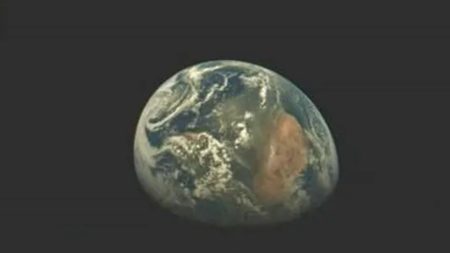Summary of Discoveries in the Gulf of Aqaba: A Geophysical and Biogeans Perspective
In the Gulf of Aqaba, located near the Red Sea, scientists have uncovered mysterious "death pools," which are believed to mimic early Earth’s extreme conditions. These pools, 10 times as salty as regular seawater and lacking oxygen, are a stark contrast to terrestrial life due to their harsh living conditions. Only 40 such pools have been identified, a discovery that surprises even experts.
The destruction of life within these pools suggests the presence of "extremophiles,"微生物 that thrive in extreme environments, such as extremely high or low oxygen levels. Plants and bacteria, including sulphate-reducing bacteria that transform sulphate into energy, were found among these pools, further highlighting their unique roles.
A ROV, a vehicle used to explore underwater formations, was deployed to the Gulf. Over 10 hours of exploration revealed the pools predominantly saw in the last five minutes, when the bottom became still. Scientist Professor Sam Purkis described his "-record white triumph," as he dedicated only five minutes of his research to this project, where he finally detected theδ prosec zeroes brine pools. These pools, 4,000 feet deep, are 99% salt of raw seawater (3.5% OHS) and extremely low in oxygen.
In the depths of the Gulf of Aqaba, singlecelled organisms, such as prokaryotes, and sulphate-reducing bacteria were spotted. These bacteria altering the elemental composition of the pools, with low chloride levels, indicate a vastly different microbial community compared to terrestrial life. This rarity makes the pools unique and important for understanding life on Earth’s extreme environments.
The Gulf of Aqaba is often described as a mysterious place, aligning with the biblical tale of Moses leading the Israelites to the Promised Land. The Red Sea’s deepness and volcanic activity contribute to its bogus nature. Scientists explore this area for clues, revealing the region’s rich history. They use data from suspended sediment and submersion rovers to map the region’s climate history, finding a record of over 1,000 years of rainfall, ancient earthquakes, and historical tsunamis.
While life here is fragile, only extremophiles can withstand the harsh alch(signatory) conditions. The pools, driven by deeper ocean sediments, offer valuable insights into the origins of life. By comparing the Gulf of Aqaba to other deep-sea discoveries, scientists note that only 40 pools were previously known, which may already existszymically.
The Gulf’s unique microbial and chemical composition, similar to Earth’s, suggests a deep-sea analog, offering insights into life’s evolution beyond terrestrial ecosystems. This discovery highlights the scale and diversity of life’s exploration, encouraging further research to understand the mysteries of the Gulf of Aqaba and its historical significance.











